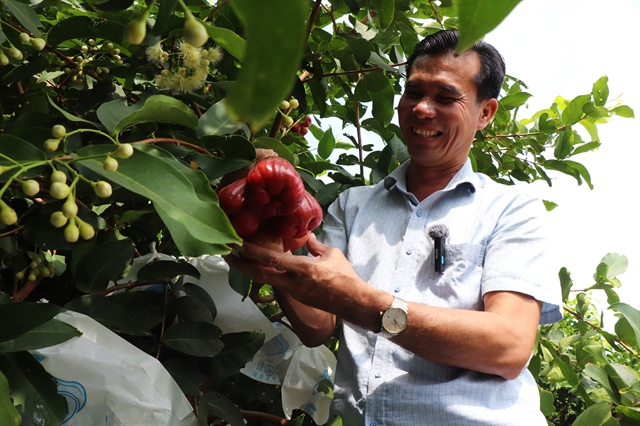 Society
Society

.jpg)
|
| Deputy Prime Minister Vũ Đức Đam chairs the online meeting with 63 cities and provinces on the reopening of schools on Thursday. — VNA/VNS Photo Văn Điệp |
HÀ NỘI — Deputy Prime Minister Vũ Đức Đam has said that solutions to bring children back to school must be long-term and proactive, with a high sense of vigilance.
The return of children to school must follow guidelines on safely adapting, while flexibly and effectively controlling the COVID-19 pandemic.
Speaking at an online conference with 63 cities and provinces about the reopening of schools after a year-long closure held on Thursday, Đam said children's attendance at school was important in ensuring human resources for socio-economic recovery and development, especially with forecasts that the SARS-CoV-2 virus would continue posing a threat.
After two years of COVID-19 prevention and control measures and high vaccine coverage, as well as improved awareness and specific treatment regimens, the reopening of schools is an urgent requirement to avoid consequences for society as children have remained at home for a long time.
He stressed that the reopening of schools must have a unified direction across the country, but applies flexibly in localities with different levels of risk, as well as in urban and rural areas.
Preparation to ensure safety for students must be detailed and up to date.
The Ministry of Education and Training has made great efforts to send children to school safely. After more than a week of reopening schools, localities need to evaluate the situation, adjust if necessary and prepare measures to ensure safety, he said.
Children under the age of 12 have not been vaccinated, so the rate of infections would increase quickly when schools reopened, but the severity of cases may remain low. These were two factors that needed to be considered in order to have appropriate measures and avoid overloading of the health sector while minimising the infection rate.
Since February 7, 54 cities and provinces have resumed in-person studies for preschool children, 59 provinces and cities have allowed primary school students to go to school, and all high schools and universities have reopened. The total number of students going back to school accounted for 93.7 per cent of the total nationwide.
From February 21, 59 out of 63 localities would welcome back pre-school children to school. Primary schools would re-open for all students nationwide.
Minister of Education and Training Nguyễn Kim Sơn said the policy of sending students back to school has received support from parents and society.
However, some localities were forced to switch back to online learning after seeing a sharp increase in the number of teachers and students infected with the virus, especially after the Lunar New Year holiday.
A few localities have not yet decided on a specific timeline for preschool children and primary school students to go back to school while others have different views on the time, scale and the method of in-person learning.
Some schools were still confused about handling F0 and F1 cases. The tracing and zoning of F1 cases has remained improper, leaving many students quarantined at home instead of going to school. There were cases in which a whole grade stopped in-person studies when a new infection was detected.
Some localities even required students to be tested for COVID-19 before going to school in person, causing negative reactions among parents, he said.
Sơn said that maintaining social distancing was challenging for schools because of the large number of students. Schools were also facing other challenges such as the arrangement of extra classes, a shortage of teachers, and low funds for COVID-19 prevention equipment.
The minister has asked the Government to direct localities to develop a consistent plan for bringing children to school safety.
He has also asked the Ministry of Health to shorten the quarantine period and number of COVID-19 tests for teachers and students who were detected as F1. The Ministry of Health needs to issue guidelines on testing students when they come to class and a manual to help parents treat infected children at home.
At the conference, representatives of Hà Nội’s People’s Committee said the capital city has the highest number of schools in the country with more than 12,800, and leads in the number of infections with nearly 4,000 cases per day.
The city proposed the Ministry of Health develop a treatment regime for children with COVID-19 in medical facilities and soon deploy COVID-19 vaccines for children between 5-11 years old as well as research vaccines for children under 5.
Given that the guidelines of the Ministry of Health and the Ministry of Education and Training on F1 cases are different, leaders of HCM City People's Committee suggested that the Ministry of Education and Training reconsider the identification of F1 cases.
In reply to comments from localities, Deputy Health Minister Nguyễn Trường Son said the country recorded about 329,000 cases of COVID-19 in the first two weeks of this month.
Of those, 28,314 cases, accounting for 8.6 per cent of the total, were children between 5 and 18 years old, and 5,800 cases, accounting for 4.8 per cent of the total, were children under five.
Sơn said that the ministry issued guidance on the classification of F0 and F1 cases on December 29. He required localities to stop conducting mass COVID-19 tests for students before entering class.
He also said there was no difference in the risk of infection for students who attended one or two sessions at school. Therefore, all schools meeting pandemic prevention and control requirements could organise semi-boarding classes for students to reduce trouble for parents.
The ministry would soon issue guidelines on care and treatment for students with COVID-19 to ensure peace of mind for parents, he said.
At the conclusion of the meeting, the Deputy PM said it was necessary to implement a vaccine campaign for children between 5 and 12 years old, control the rate of infections in schools, and develop treatment plans for F0 students.
He also asked the Ministry of Education and Training to organise online learning methods as part of the educational reform programme. — VNS




